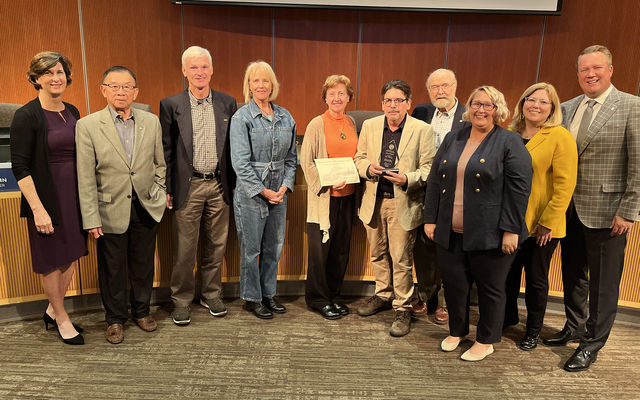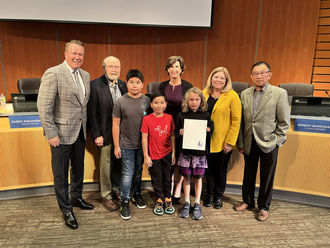Published October 13 2022

Plus, affordable housing, transportation award and students presented with proclamation
On Monday, the City Council had an in-depth review and discussion on Bellevue Utilities’ proposed 2023-2024 budget and customer rates.
The presentation noted that Utilities is not immune to rising costs in our region and is facing significant external cost increases from wholesale service providers for drinking water supply and wastewater treatment. In addition, Bellevue Utilities is making necessary capital investments to care for aging infrastructure, noting that prudent investment in infrastructure now is imperative to ensure future generations will not face major system failures.
To ensure a forward-thinking, sustainable approach to utility services, Bellevue Utilities has a two-year operating budget of $378.1 million and a seven-year capital investment program of $318 million. Utilities is proposing a combined rate increase of 6.7% in 2023 and 5.8% in 2024 for water, sewer and stormwater management services. This translates into a monthly increase of $13.18 in 2023 and $12.19 in 2024 for a typical residential customer.
Recognizing the region is facing affordability concerns, Utilities offers an Emergency Assistance Program along with utility rate and tax relief programs to aid customers facing financial hardships. Customers are encouraged to contact Utilities about these and other support services.
Utilities is not funded by tax revenue; instead, Bellevue utility services are primarily funded by customer rates, and the city benchmarks rates against neighboring cities to ensure rates remain comparable. After a lengthy budget and rate-setting process including public outreach, the proposed budget was reviewed and unanimously recommended for adoption by the Environmental Services Commission, the resident advisory committee that advises the council on Utilities policies and budget.
The full council presentation is available on replay through Bellevue Television.
Affordable housing work including micro-apartments
Councilmembers received a biannual Affordable Housing Strategy update, which included a progress report on affordable housing units achieved through about the halfway point of the city’s Affordable Housing Strategy, adopted in 2017. Since adoption, the program has either preserved or created 2,072 affordable units, with 809 in the pipeline for development.
A discussion on council-directed Next Right Work items, which the city has prioritized for completion in the next 12 to 18 months, was part of the update, including reducing barriers to creating micro-apartments, allowing higher density in mixed-use residential areas and reducing permitting costs for affordable housing projects.
The update also highlighted the city’s Housing Stability Program, which is using funds through state House Bill 1590 for housing and related supportive services, the recently updated multifamily tax exemption program, which has nearly 300 affordable housing units identified through future projects, in addition to 147 units already approved for development, and Phase 2 of the Affordable Housing Action C-1, which is being explored as a way to further increase residential density on certain faith-owned properties in the city.
The update mentioned an upcoming Housing Needs Assessment and housing capacity analysis, in addition to an Environmental Impact Statement being developed as part of the city’s Comprehensive Plan Periodic Update that will help inform affordable housing policy development and future actions.
The council also unanimously approved the initiation of land use code amendments that will remove barriers to the development of micro-apartments. Micro-apartments present an opportunity to increase and diversify the city’s overall housing supply because lower-cost housing units are made available by these small square-footage units. This land use code amendment will include updates to provisions that currently limit the development of this type of housing.
The Planning Commission will begin considering code amendments for removing barriers to micro-apartments later this year. More information will be available at Code Amendments. Meanwhile, more information about all the housing topics discussed at the meeting are available in the agenda items.
Transportation mobility award
The city was honored by the state Department of Commerce with the 2022 Governor’s Smart Communities Award in the “smart projects” category for the successful implementation of its Mobility Implementation Plan.
On Monday, Valerie Smith, Deputy Managing Director for the state Department of Commerce, presented the award to council, the Transportation Commission chair and Transportation staff. The award recognizes outstanding work by local governments in creating vibrant and livable communities by achieving the goals of the Growth Management Act.
The MIP was adopted in April and its objective is to provide a new long-range planning framework to help city officials decide on transportation project investments based on what people want in their transportation system, the quality of life they expect and what users of all ages and abilities need to reach their destinations through all modes of transportation.
Students presented with proclamation
Among three proclamations made by the mayor and council was Walk and Roll to School Day, to encourage safe, healthy and sustainable routes to school for our community’s children.
Students from the Bellevue School District were on hand to accept the proclamation, raise awareness for safely getting to and from school and celebrate all the ways to walk or roll to school or the bus stop.
The council also issued proclamations for Indigenous Peoples’ Day on Oct. 10 and the 50th anniversary of the Chinese Information and Service Center, which is hosting a celebration for the anniversary in Bellevue this month. CISC Executive Director Michael Itti was on hand to accept that proclamation.
NOTE: The next City Council meeting will be on Oct. 24 due to the cancelation of the Oct. 17 meeting.

